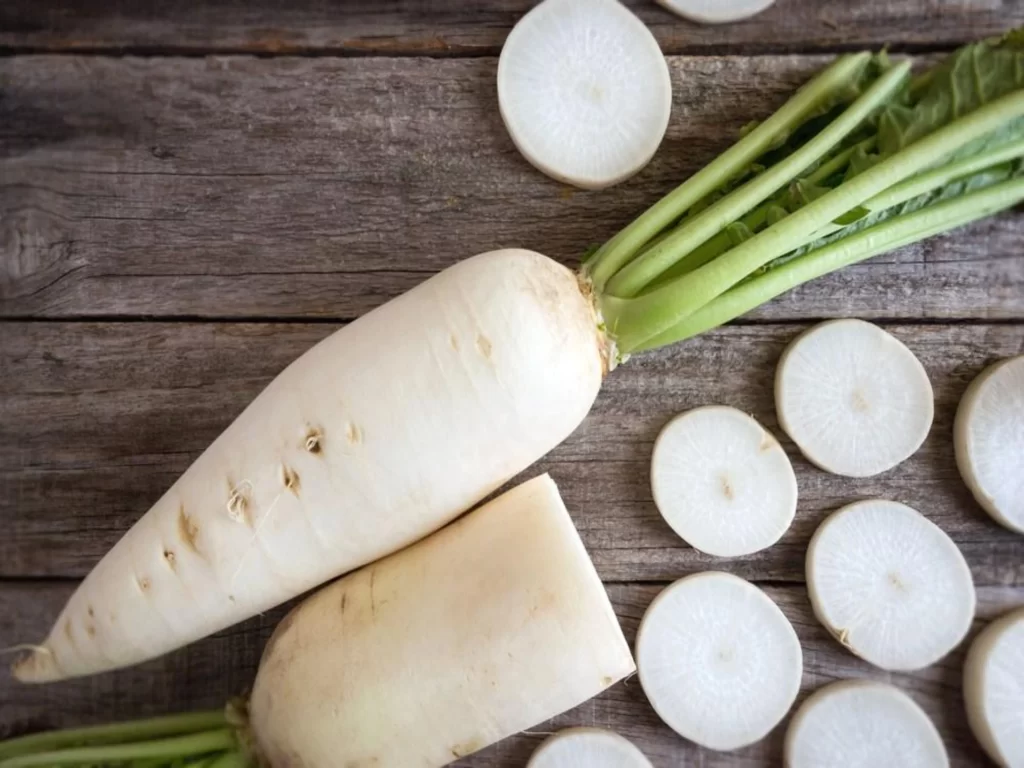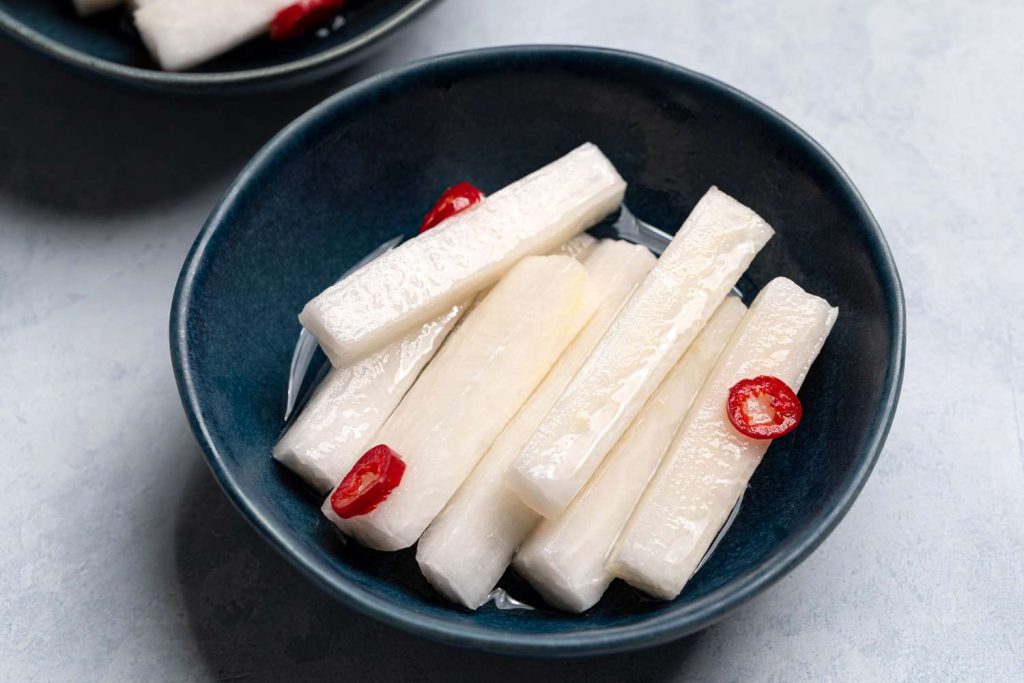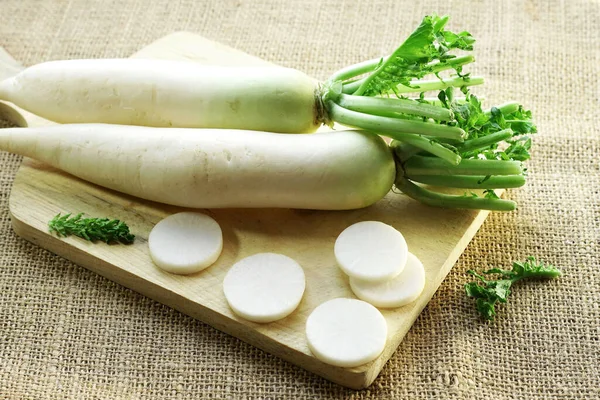Daikon Radish
Daikon Radish, also known as “mooli” in Urdu, is a type of radish with a mild flavor and crisp texture. Here is information on various aspects of daikon radish:
Meaning in Urdu:
Daikon Radish is known as “mooli” in Urdu.
Daikon Radish Benefits:
Daikon radish offers several health benefits. It is low in calories and fat, high in dietary fiber, and a good source of vitamin C. It also contains antioxidants and minerals like potassium, phosphorus, and calcium. Daikon radish is believed to aid digestion, support the immune system, and promote detoxification.

Daikon vs. White Radish:
Daikon radish is often referred to as white radish. The term “white radish” generally encompasses various radish varieties, including daikon. However, daikon specifically refers to a large, elongated, and mild-flavored variety ofwhite radish.
Daikon Radish Recipe:
Daikon radish can be used in a variety of dishes. It can be sliced and added to salads, grated and used in slaws, or cooked in stir-fries and soups. One popular dish is Daikon Radish Soup, which involves simmering daikon with other ingredients such as meat or vegetables.
Eating Daikon Radish Raw:
Yes, daikon radish can be eaten raw. Its mild flavor and crisp texture make it suitable for adding to salads or enjoying as a crunchy snack.
Daikon Benefits for Male:
Daikon radish is known to have aphrodisiac properties and is believed to enhance male fertility. However, scientific evidence supporting these claims is limited, and more research is needed.
Daikon Benefits for Skin:
Daikon radish is rich in vitamin C and antioxidants, which can benefit the skin. These nutrients help promote collagen production, improve skin elasticity, and protect against free radicals, potentially contributing to healthier skin.
Daikon Side Effects:
Daikon radish is generally safe to consume. However, some people may experience digestive issues like gas or bloating if consumed in large quantities. If you have any specific health conditions or concerns, it is advisable to consult a healthcare professional.
Daikon Benefits for Diabetes:
Daikon radish has a low glycemic index and contains dietary fiber, which may help regulate blood sugar levels. However, people with diabetes should still monitor their carbohydrate intake and consult with a healthcare professional for personalized dietary advice.
Daikon Benefits for Liver:
Daikon radish is believed to have detoxifying properties, which may benefit liver health. It contains enzymes that assist in the breakdown of fatty acids and supports liver function. However, more research is needed to fully understand its effects on liver health.
Is Daikon Radish Healthy:
Yes, daikon radish is considered a healthy food choice. It is low in calories, fat-free, and packed with beneficial nutrients like dietary fiber, vitamin C, and minerals.
Is Daikon Good for Kidney Disease:
Daikon radish is generally considered safe for individuals with kidney disease. However, people with kidney disease should monitor their potassium intake, as daikon radish contains a moderate amount of potassium. It is advisable to consult with a healthcare professional or a registered dietitian for personalized dietary guidance.
Daikon Radish Vitamins:
Daikon radish is a good source of vitamin C and contains smaller amounts of other vitamins such as folate, vitamin B6, and vitamin K.
Daikon Radish Nutrition:
Daikon radish is low in calories and fat. It is rich in dietary fiber, vitamin C, and minerals like potassium, phosphorus, and calcium.
Daikon Calories (100g):
Approximately 18 calories per 100 grams of daikon radish.
Daikon Radish Allergy:
Some individuals may be allergic to radishes, including daikon radish. Allergic reactions can manifest as itching, swelling, hives, or respiratory symptoms. If you experience any adverse reactions after consuming daikon radish, it is recommended to seek medical advice.
Daikon Radish Recipe Soup:
Daikon radish soup is a popular dish in many Asian cuisines. It typically involves simmering daikon with other ingredients such as meat or vegetables in a flavorful broth.
Daikon Radish Uses:
Daikon radish can be used in various ways, such as raw in salads, grated in slaws, cooked in stir-fries and soups, or pickled as a condiment. Its versatility makes it suitable for a wide range of dishes.
Is Daikon Radish Good for You:
Yes, daikon radish is considered a nutritious vegetable. It is low in calories, contains beneficial nutrients, and can be part of a balanced and healthy diet.
Pickled Daikon Radish:
Daikon radish is commonly pickled in Asian cuisine. The pickling process adds a tangy flavor and enhances the radish’s crisp texture.

Please note that while I strive to provide accurate and up-to-date information, it’s always a good idea to consult with a healthcare professional or a registered dietitian for personalized advice regarding your specific health conditions or dietary needs

